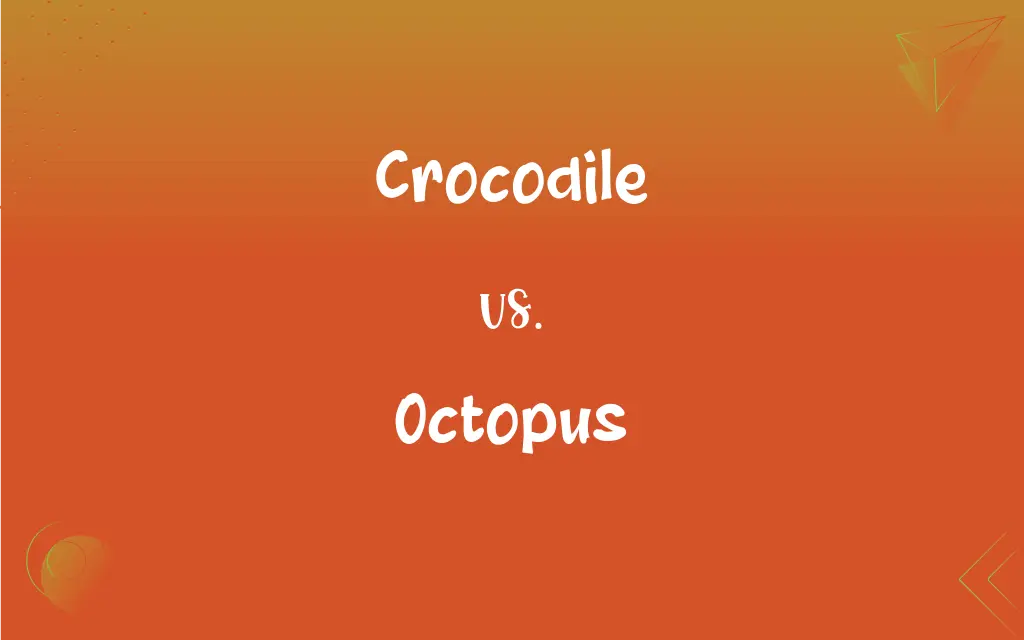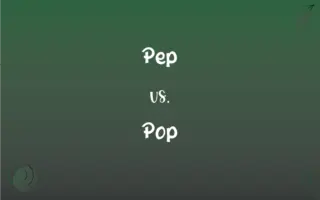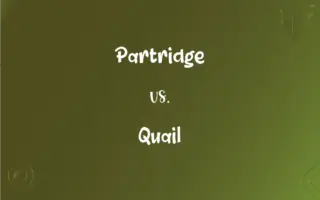Crocodile vs. Octopus: What's the Difference?
Edited by Aimie Carlson || By Janet White || Updated on September 18, 2023
A crocodile is a large, carnivorous reptile with a long snout and strong jaws, commonly found in freshwater habitats. An octopus is a soft-bodied, eight-armed mollusk that lives in saltwater environments and is known for its intelligence.

Key Differences
A crocodile is a member of the Crocodilia order, falling under the class of reptiles. They are large, carnivorous animals primarily residing in freshwater habitats like rivers, lakes, and swamps. On the other hand, an octopus belongs to the class Cephalopoda, under the phylum Mollusca. They are sea-dwelling creatures that inhabit oceans and are notably intelligent and agile.
The anatomy of crocodiles and octopuses is distinctly different. Crocodiles have a tough, scaly skin and a V-shaped snout filled with sharp teeth. They are cold-blooded and rely on external factors to regulate their body temperature. Octopuses, conversely, have soft, malleable bodies with eight arms covered in suckers. They are known for their ability to change color and texture to blend in with their surroundings.
When it comes to behavior, crocodiles are less flexible and generally more aggressive. They are apex predators in their habitats, feeding mainly on fish, birds, and mammals. Octopuses are opportunistic predators that eat a variety of sea creatures and have been known to exhibit problem-solving skills.
From a grammatical perspective, both "crocodile" and "octopus" function primarily as nouns. However, the plural form of crocodile is straightforward— "crocodiles," while the plural form of octopus can be either "octopuses" or the more technical "octopodes." In essence, crocodiles and octopuses are vastly different animals, inhabiting different ecosystems and possessing unique anatomical and behavioral traits.
Comparison Chart
Taxonomic Class
Reptilia
Cephalopoda
ADVERTISEMENT
Habitat
Freshwater
Saltwater
Body
Scaled, tough skin
Soft, malleable body
Plural Form
Crocodiles
Octopuses or Octopodes
Predatory Behavior
Less flexible, more aggressive
Opportunistic, exhibits intelligence
Crocodile and Octopus Definitions
Crocodile
A freshwater-dwelling predator.
The crocodile lurked beneath the water's surface.
ADVERTISEMENT
Octopus
A member of the class Cephalopoda.
Octopuses are related to squids and cuttlefish.
Crocodile
An animal with tough, scaly skin.
The crocodile's skin is often used for leather goods.
Octopus
An intelligent sea creature.
The octopus solved the puzzle to get to its food.
Crocodile
A large, carnivorous reptile with a long snout.
The crocodile sunned itself on the riverbank.
Octopus
A soft-bodied ocean dweller.
The octopus squeezed through a narrow gap in the rocks.
Crocodile
A member of the order Crocodilia.
Crocodiles are closely related to alligators.
Octopus
A marine mollusk with eight arms.
The octopus camouflaged itself against the coral.
Crocodile
Any of various large aquatic reptiles of the family Crocodylidae that are native to tropical and subtropical regions and have thick, armorlike skin and long tapering jaws.
Octopus
Any of various carnivorous marine cephalopod mollusks chiefly of the family Octopodidae, having a soft body, eight arms with suckers, a large distinct head, and a mouth with a strong beak.
Crocodile
A crocodilian reptile, such as an alligator, caiman, or gharial.
Octopus
Something, such as a multinational corporation, that has many powerful, centrally controlled branches.
Crocodile
Leather made from crocodile skin.
Octopus
Any of several marine molluscs of the family Octopodidae, having no internal or external protective shell or bone (unlike the nautilus, squid and cuttlefish) and eight arms each covered with suckers.
Crocodile
Chiefly British A line of people, especially pupils or choir members, standing two abreast.
Octopus
(uncountable) The flesh of these marine molluscs eaten as food.
Crocodile
Any of the predatory amphibious reptiles of the family Crocodylidae; (loosely) a crocodilian, any species of the order Crocodilia, which also includes the alligators, caimans and gavials.
Octopus
An organization that has many powerful branches controlled from the centre.
Crocodile
A long line or procession of people (especially children) walking together.
Octopus
To put (or attempt to put) one's fingers, hands or arms in many things or places at roughly the same time.
Crocodile
(logic) A fallacious dilemma, mythically supposed to have been first used by a crocodile.
Octopus
To spread out in long arms or legs in many directions.
Crocodile
(intransitive) To speak one's native language at an Esperanto-language gathering, rather than Esperanto.
Octopus
To plug a large number of devices into a single electric outlet.
Crocodile
A large reptile of the genus Crocodilus, of several species. They grow to the length of sixteen or eighteen feet, and inhabit the large rivers of Africa, Asia, and America. The eggs, laid in the sand, are hatched by the sun's heat. The best known species is that of the Nile (Crocodilus vulgaris, or Crocodilus Niloticus). The Florida crocodile (Crocodilus Americanus) is much less common than the alligator and has longer jaws. The name is also sometimes applied to the species of other related genera, as the gavial and the alligator.
Octopus
(by extension) To grow in use vastly beyond what was originally intended.
Crocodile
A fallacious dilemma, mythically supposed to have been first used by a crocodile.
Octopus
To hunt and catch octopuses.
Crocodile
Large voracious aquatic reptile having a long snout with massive jaws and sharp teeth and a body covered with bony plates; of sluggish tropical waters
Octopus
To behave like an octopus.
Crocodile
A reptile with strong jaws and sharp teeth.
The crocodile clamped down on its prey.
Octopus
A genus of eight-armed cephalopods, including numerous species, some of them of large size. See Devilfish.
Octopus
Any member of the genus Octopus.
Octopus
Something resembling an octopus in having numerous controlling arms or branches that reach widely and influence many activities; - used mostly of organizations, such as diversified corporations.
Octopus
Tentacles of octopus prepared as food
Octopus
Bottom-living cephalopod having a soft oval body with eight long tentacles
Octopus
An animal with the ability to change color.
The octopus turned red when it was alarmed.
FAQs
What is an Octopus?
An octopus is a marine mollusk with eight arms, known for its intelligence.
Do Octopuses Have Bones?
No, octopuses do not have bones.
How Many Arms Does an Octopus Have?
An octopus has eight arms.
What do Octopuses Eat?
Octopuses eat a variety of sea creatures, including crabs and shellfish.
What is a Crocodile?
A crocodile is a large, carnivorous reptile found mainly in freshwater habitats.
How do Crocodiles and Octopuses Differ?
Crocodiles are reptiles in freshwater, while octopuses are mollusks in saltwater.
How Intelligent is an Octopus?
Octopuses are known for their high intelligence and problem-solving skills.
Can Octopuses Camouflage?
Yes, many octopuses can change color to blend in with their surroundings.
Are Crocodiles Cold-Blooded?
Yes, crocodiles are cold-blooded animals.
What do Crocodiles Eat?
Crocodiles mainly eat fish, birds, and mammals.
Are Crocodiles Social Animals?
Crocodiles are generally not social and can be territorial.
How Fast Can a Crocodile Run?
A crocodile can run up to 11 mph on land.
What's the Plural of Octopus?
The plural can be "octopuses" or "octopodes."
What's the Plural of Crocodile?
The plural is "crocodiles."
Are Crocodiles Endangered?
Some species are endangered, but not all crocodiles are at risk.
About Author
Written by
Janet WhiteJanet White has been an esteemed writer and blogger for Difference Wiki. Holding a Master's degree in Science and Medical Journalism from the prestigious Boston University, she has consistently demonstrated her expertise and passion for her field. When she's not immersed in her work, Janet relishes her time exercising, delving into a good book, and cherishing moments with friends and family.
Edited by
Aimie CarlsonAimie Carlson, holding a master's degree in English literature, is a fervent English language enthusiast. She lends her writing talents to Difference Wiki, a prominent website that specializes in comparisons, offering readers insightful analyses that both captivate and inform.































































